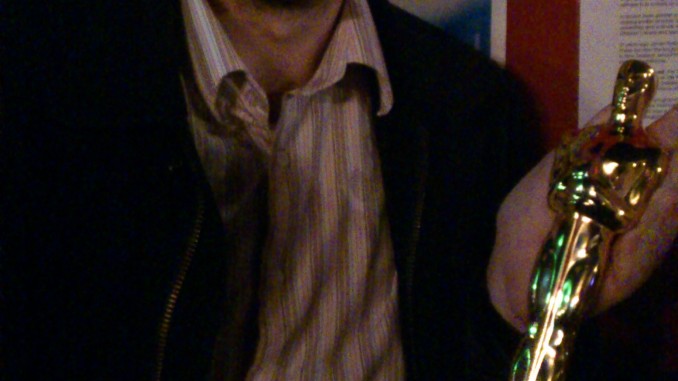
And the Oscar goes to… [by James Wenley]
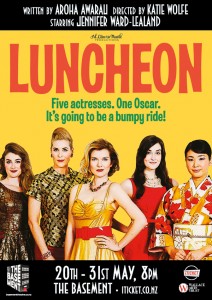
For a play that deals with the fickleness of fame, the most telling feature that of the five actresses gathered for luncheon to mark their nominations in the 1958 best supporting actress race, none of the them are well-known today. Certainly, reading the characters names down the program, none of them were immediately familiar to this sometimes film buff. The 1958 Oscar ceremony was notable as the first live televised Oscar-cast, and the dominance of Best Picture The Bridge on the River Kwai. That years supporting actress race included the first nomination for a Japanese actress, Miyoshi Umeki, who co-starred with Marlon Brando in Sayonara. First time playwright, journalist Aroha Awarau, has taken this footnote to craft a bubbly comedy that has attracted some top-shelf talent, including the return of director Katie Wolfe to the theatre.
Luncheon is also a play that deals with the fickleness of the famous. We get a real sense of the actresses sizing up the competition as they get together for the soiree hosted by nominee Carolyn Jones (Hannah Banks). There’s an obvious thread of the cultural outsider, as Miyoshi (Tomoko Taouma) is welcomed into the Hollywood fold with varying degrees of acceptance. But the other types gathered too gives much material for Awarau to use. Jones is the star on the come-back, who’s been recognized for her 5 minutes, 27 seconds of screen time in The Bachelor Party, and sees her nomination as the chance to cement her career. Elsa Lanchester (Jennifer Ward-Lealand) is the British veteran, a previous nominee and professed Oscar skeptic who returns to the world of theatre whenever Hollywood gets too crazy. Diane Varsi (Alex Jordan) is the overwhelmed newcomer. And Hope Lange (Lauren Gibson) is the ambitious starlet whose acting ability can’t disguise the contempt she feels for her fellow nominees. With this combination of overstretched egos and devastating anxieties, matched with the glittering promise of Oscar gold, conflict is not far away.
A good comedic pace is set early, especially with the arrival of first guest, Elsa, who has cultivated a mischievous streak to survive in Hollywood-land, as if to suggest she’s above it all and doesn’t take things all that seriously (though this façade is questionable). Awarau easily works in interesting biographical detail to Elsa’s scene with Jones, such as the fact that her character was the only girl in an all boy’s school. She has awareness that all she’ll likely to remembered for is what she looked like as the early film The Bride of Frankenstein. Goaded by Carolyn’s husband Aaron Spelling (Bede Skinner), we are also treated to a fun horror-movie off between the two actresses.
Apart from Hope, the characters are reluctant to publicly reveal a desire for the Golden statue. Indeed, there’s a strong ambivalence towards the award. “Winning an Oscar’s really rather insignificant” says Elsa, a previously unsuccessful nominee. They agree it can be the “kiss of death” for one’s career. The darker side of Hollywood sneaks out, such as the studio demanded plastic surgery, petty star rivalries, constant “gossip and talk”, and domestic abuse.
The casting matches the actresses superbly well. Ward-Lealand’s performance is gong-worthy, Bank’s is wonderfully stroppy, her facial flicks aptly reveal the character’s anxieties, and Gibson and Jordan also deserve to be recognised. Newcomer Tomoko Taouma gives a believable characterization, but her vocal work is soft and difficult to catch, especially when the wide expanse of John Verryt’s unfussy 50s era set and the Basement spatial configuration has action taking place far away for audience members seated to the left or right.
Costume Designer Rose Jackson provides a suitable touch of 50s glamour, though Diane Varsi’s stood out as seeming too contemporary, and too casual for someone so anxious about the Oscar events – would this not have meant she’d take even more extreme care over her appearance?
The lunch itself moves towards a moment of farce that wasn’t adequately achieved on opening night, perhaps needing more energy, and more support from sound and lighting design to help sell the moment?
It feels like the luncheon is over all too soon, and the play ends with some dramatic hooks unrealized (what had happened to Jones in her past that her and her husband could not speak of?). The play’s conclusion doesn’t fulfill in of itself, but relies instead on a historical coda: a clip of the real 1958 ceremony where the winner is revealed. Taking our knowledge of the play with us, it’s makes for peculiarly affecting viewing, offering reflection on the meaning of this moment for both the recipient and unsuccessful nominees; did it matter?
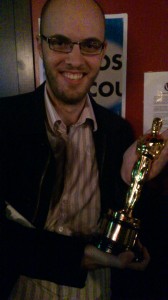
There’s some fun to be had (as well as some sobering discoveries) once home wikipediaing these actors biographies and discovering the trivia surrounding their ongoing careers – Jones would go on to originate Morticia in The Addams Family, and I was pleased to find out that Lanchester played Katie Nanna in Mary Poppins. And if you’re lucky, you might even get your own special (authentic!) Oscar moment in the foyer…
Luncheon is presented by I’d like to thank productions and plays at The Basement until 31 May. Details see The Basement.
SEE ALSO: Theatreview.org.nz review by Nik Smythe

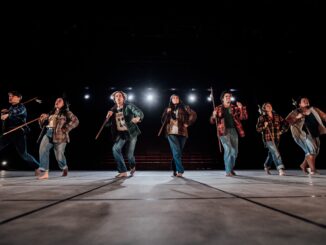
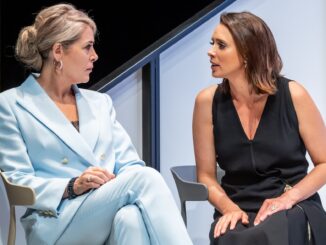
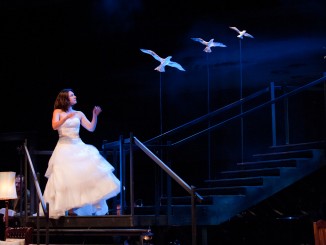
I have never been to the theatre in auckland before (I am from the UK), but going to the basement was a real treat. A great venue, where you felt up near the action and what superb action. I laughed but also reflected on the characters and their actions. Packed with clever ways of showing the egotistical, and fragile people in Hollywood.